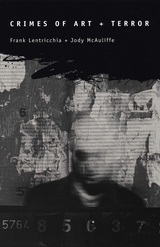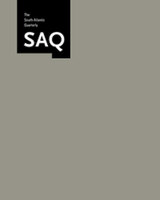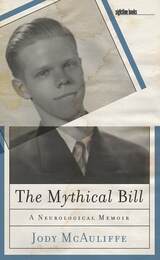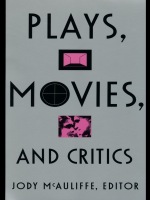4 books about McAuliffe, Jody

Crimes of Art and Terror
Frank Lentricchia and Jody McAuliffe
University of Chicago Press, 2003
Do killers, artists, and terrorists need one another? In Crimes of Art and Terror, Frank Lentricchia and Jody McAuliffe explore the disturbing adjacency of literary creativity to violence and even political terror. Lentricchia and McAuliffe begin by anchoring their penetrating discussions in the events of 9/11 and the scandal provoked by composer Karlheinz Stockhausen's reference to the destruction of the World Trade Center as a great work of art, and they go on to show how political extremism and avant-garde artistic movements have fed upon each other for at least two centuries.
Crimes of Art and Terror reveals how the desire beneath many romantic literary visions is that of a terrifying awakening that would undo the West's economic and cultural order. This is also the desire, of course, of what is called terrorism. As the authority of writers and artists recedes, it is criminals and terrorists, Lentricchia and McAuliffe suggest, who inherit this romantic, destructive tradition. Moving freely between the realms of high and popular culture, and fictional and actual criminals, the authors describe a web of impulses that catches an unnerving spirit.
Lentricchia and McAuliffe's unorthodox approach pairs Dostoevsky's Crime and Punishment with Martin Scorsese's King of Comedy and connects the real-life Unabomber to the surrealist Joseph Cornell and to the hero of Bret Easton Ellis's bestselling novel American Psycho. They evoke a desperate culture of art through thematic dialogues among authors and filmmakers as varied as Don DeLillo, Joseph Conrad, Francis Ford Coppola, Jean Genet, Frederick Douglass, Hermann Melville, and J. M. Synge, among others. And they conclude provocatively with an imagined conversation between Heinrich von Kleist and Mohamed Atta. The result is a brilliant and unflinching reckoning with the perilous proximity of the impulse to create transgressive art and the impulse to commit violence.
Crimes of Art and Terror reveals how the desire beneath many romantic literary visions is that of a terrifying awakening that would undo the West's economic and cultural order. This is also the desire, of course, of what is called terrorism. As the authority of writers and artists recedes, it is criminals and terrorists, Lentricchia and McAuliffe suggest, who inherit this romantic, destructive tradition. Moving freely between the realms of high and popular culture, and fictional and actual criminals, the authors describe a web of impulses that catches an unnerving spirit.
Lentricchia and McAuliffe's unorthodox approach pairs Dostoevsky's Crime and Punishment with Martin Scorsese's King of Comedy and connects the real-life Unabomber to the surrealist Joseph Cornell and to the hero of Bret Easton Ellis's bestselling novel American Psycho. They evoke a desperate culture of art through thematic dialogues among authors and filmmakers as varied as Don DeLillo, Joseph Conrad, Francis Ford Coppola, Jean Genet, Frederick Douglass, Hermann Melville, and J. M. Synge, among others. And they conclude provocatively with an imagined conversation between Heinrich von Kleist and Mohamed Atta. The result is a brilliant and unflinching reckoning with the perilous proximity of the impulse to create transgressive art and the impulse to commit violence.
[more]

Mysterious Actions
New American Drama, Volume 99
Jody McAuliffe, ed.
Duke University Press
With this special issue, South Atlantic Quarterly presents five never-before-published plays by some of the brightest stars in contemporary American theater. Mysterious Actions presents works that go beyond realism and will challenge audiences’ expectations,moving them toward a revolutionary theatrical experience. The plays by Neal Bell, Nilo Cruz, Erin Cressida Wilson, Marlane Meyer, and Don DeLillo employ techniques and situations that are original and unexpected. Each is followed by a scholarly analysis by such respected critics as Fredric Jameson, José Esteban Muñoz, and Frank Lentricchia, as well as an interview with each playwright.
Monster, by Neal Bell, is a powerful adaptation of Mary Shelley’s Frankenstein, thrusting the violence of the novel into the sharp relief of our times. Nilo Cruz’s Two Sisters and a Piano takes an intimate look at Cuba during the collapse of the Soviet Union and contemplates the meaning of “Cubanness” in today’s culture. The Mystery at the Middle of Ordinary Life, DeLillo’s short play, meditates on the “gradually shattering” nature of human relationships. In The Trail of Her Inner Thigh, Erin Cressida Wilson follows a boy-man as he embarks on an epic journey into emotionality and sensuality with the help of the women in his life. And Marlane Meyer’s play, The Mystery of Attraction, navigates the dangerous waters of contemporary masculinity.
Monster, by Neal Bell, is a powerful adaptation of Mary Shelley’s Frankenstein, thrusting the violence of the novel into the sharp relief of our times. Nilo Cruz’s Two Sisters and a Piano takes an intimate look at Cuba during the collapse of the Soviet Union and contemplates the meaning of “Cubanness” in today’s culture. The Mystery at the Middle of Ordinary Life, DeLillo’s short play, meditates on the “gradually shattering” nature of human relationships. In The Trail of Her Inner Thigh, Erin Cressida Wilson follows a boy-man as he embarks on an epic journey into emotionality and sensuality with the help of the women in his life. And Marlane Meyer’s play, The Mystery of Attraction, navigates the dangerous waters of contemporary masculinity.
Contributors. Neal Bell, Nilo Cruz, Don DeLillo, Frederic Jameson, William Davies King, Frank Lentricchia, Jody McAuliffe, Marlane Meyer, José Esteban Muñoz, Teri Reynolds, Erin Cressida Wilson
[more]

The Mythical Bill
A Neurological Memoir
Jody McAuliffe
University of Iowa Press, 2013
Part medical mystery, part war story, and part social and family history, The Mythical Bill is the story of how one man’s physical and mental pain radiates outward into the life and mind of each member of his family. Weaving together diary entries, correspondence, and scrupulous research, Jody McAuliffe examines her father’s life before, during, and after WWII, seeking answers to the questions of what really happened to Bill McAuliffe and what caused his disintegration. His initial postwar diagnosis was torticollis: a condition of persistent involuntary contraction of the neck muscles, causing the head to be twisted to an abnormal position. But torticollis was only the beginning of Bill’s suffering and his daughter’s efforts to understand it. The condition becomes a metaphor for things that refuse to fall into place: the body not in accord with the mind, the head that turns away from reality.
From this drama of dislocation and disjointed truths, two braided selves emerge: the I of Jody and the I of Bill. Through this doubleness, the writer probes a set of questions about how much we shape ourselves and how much we are shaped by forces beyond our control.
The Mythical Bill, a moving and unusual book, is for people who suffer the devastating effects of combat on the psyche, for those who encounter any debilitating disease, and for those who grow up with a father only partially present. McAuliffe’s ear-catching, evocative, and often breathtaking writing forces readers to confront the most terrifying question posed by a parent’s mental illness: will I get it too? Her narrative voice is searching, compassionate, and self-deprecating, but cut through with welcome bits of humor in this daughter’s story of confusion, sadness, and loss. [more]

Plays, Movies, and Critics
Jody McAuliffe, ed.
Duke University Press, 1993
This exceptional collection explores the mutual concerns of dramatic theater, film, and those who comment on them. Plays, Movies, and Critics opens with an original play by Don DeLillo. In the form of an interview, DeLillo's short play works as a kind of paradigm of the theatrical or cinematic event and serves as a keynote for the volume.
DeLillo's interview play is accompanied in this collection by interviews with theater director Roberta Levitow, Martin Scorsese, and film/theater critic Stanley Kauffmann. Other contributions include a critical look at the current American theater scene, analyses of the place of politics in the careers of G. B. Shaw and Luigi Pirandello, a compelling reading of Chekhov's "The Seagull", a detailed inquiry into the obsessions that energize the works of Sam Shepard, provocative reinterpretations of the films Mean Streets and The Sheltering Sky, and a translation of André Bazin's important piece on theology and film.
DeLillo's interview play is accompanied in this collection by interviews with theater director Roberta Levitow, Martin Scorsese, and film/theater critic Stanley Kauffmann. Other contributions include a critical look at the current American theater scene, analyses of the place of politics in the careers of G. B. Shaw and Luigi Pirandello, a compelling reading of Chekhov's "The Seagull", a detailed inquiry into the obsessions that energize the works of Sam Shepard, provocative reinterpretations of the films Mean Streets and The Sheltering Sky, and a translation of André Bazin's important piece on theology and film.
Contributors. André Bazin, Robert Brustein, Bert Cardullo, Anthony DeCurtis, Don DeLillo, Jesse Ward Engdhal, Richard Gilman, Jim Hosney, Mame Hunt, Jonathan Kalb, Stanley Kauffmann, Jody McAuliffe, Mary Ann Frese Witt, Jacquelyn Wollman, David Wyatt
[more]
READERS
Browse our collection.
PUBLISHERS
See BiblioVault's publisher services.
STUDENT SERVICES
Files for college accessibility offices.
UChicago Accessibility Resources
home | accessibility | search | about | contact us
BiblioVault ® 2001 - 2024
The University of Chicago Press









